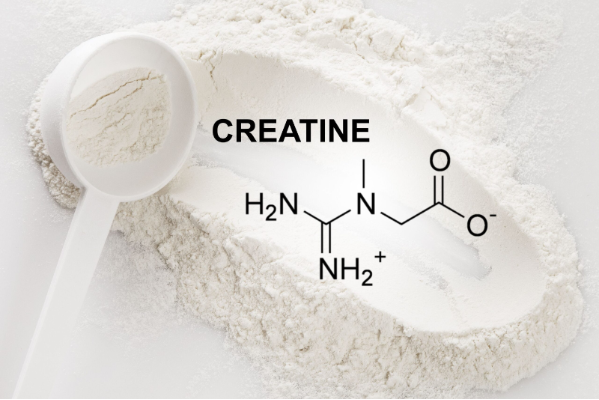Creatine Monohydrate is perhaps one of the most researched – and safest – supplements out there. [1] It has been studied for years and has historically been used by athletes for increasing strength and lean muscle mass. It is often thought of as a supplement taken by the guys in the gym to get bigger. While this may be true, there are many other reasons for a vast majority of people to consider creatine supplementation. We will discuss some of the major benefits that have been getting more attention lately, as well as some interesting and not as well-known benefits of creatine.
What is Creatine? Creatine is a naturally occurring substance in the body, made up of amino acids, found mostly in muscle cells in the form of phosphocreatine. There are also small amounts in the heart, brain and most cells in the body. About half of the creatine your body stores come from the food you eat, mainly animal protein sources like red meat and seafood. Your body produces the rest in the liver and kidneys. Phosphocreatine helps to recycle ATP, our body’s main source of energy, which is useful during quick movements such as weight training or activities that require strong cognition; it allows us to perform at a higher level overall. Supplementing with creatine monohydrate can support our brain and our body in many ways, and because it has been so strongly researched it is, shall we say, a no-brainer to take it.
Our Top Three Favorite Benefits of Creatine:
- Increase Muscle Mass – There is no question that creatine helps to increase strength, lean muscle mass and performance in athletes, as it has been well studied for years. [2] Looking at this benefit through the lens of the general population, it is an exciting intervention to prevent sarcopenia, the age-related loss of muscle mass. Sarcopenia leads to loss of function, disability and frailty. It has been linked to insulin resistance, fatigue, falls and death. [3] Adding a safe and effective supplement to your strength training routine could help to increase muscle mass, improve function and maintain a long and independent lifestyle.
- Improve Brain Health – Creatine helps improve the energy to our brain. Studies suggest that it can help with short term memory, executive function and potentially help to improve depression [4] as well as symptoms associated with concussion and TBI. [5]
- Improve Exercise and Injury Recovery – Several studies have shown the efficacy of creatine supplementation for post-exercise recovery, improved outcomes after injuries, as well as decrease in inflammatory conditions like osteoarthritis. In fact, based on the research to date in 2017, the International Society of Sports Nutrition’s position on creatine supplementation said the following:
“Given all the known benefits and favorable safety profile of creatine supplementation reported in the scientific and medical literature, it is the view of ISSN that government legislatures and sport organizations who restrict and/or discourage use of creatine may be placing athletes at greater risk—particularly in contact sports that have risk of head trauma and/or neurological injury thereby opening themselves up to legal liability. This includes children and adolescent athletes engaged in sport events that place them at risk for head and/or spinal cord injury.” [6]
Other Potential Benefits of Creatine:
More research on the possible positive effects of creatine on the gut has surfaced recently. One study showed that creatine supplementation helped to increase the reproduction of the mucus layer in the gut through the increase in ATP production. This could help improve “leaky gut”. [7]
Other potential benefits are the lowering of glucose levels, possible protection against stroke and myocardial ischemia, as well as indications in neurodegenerative diseases such as ALS, Parkinson’s and Alzheimer’s. Of course, more research needs to be done in these areas, but it is exciting to see these potential benefits knowing the safety of creatine supplementation. At the very least, knowing it will help to increase lean muscle mass in a safe and effective way, is a great reason to give creatine supplementation a try.
*Disclaimer: The information in this blog is for informational purposes only. Please always consult your doctor before considering any new diet, supplementation, or other changes to your normal nutrition and exercise routine.
**If you are going to add creatine monohydrate, be sure it is from a reputable source, as with any supplement you may take. Check out our AXIS Recommends page for the brands we trust.



Leave A Comment